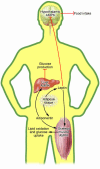AMP-activated protein kinase signaling in metabolic regulation
- PMID: 16823475
- PMCID: PMC1483147
- DOI: 10.1172/JCI29044
AMP-activated protein kinase signaling in metabolic regulation
Abstract
AMP-activated protein kinase (AMPK) is an energy sensor that regulates cellular metabolism. When activated by a deficit in nutrient status, AMPK stimulates glucose uptake and lipid oxidation to produce energy, while turning off energy-consuming processes including glucose and lipid production to restore energy balance. AMPK controls whole-body glucose homeostasis by regulating metabolism in multiple peripheral tissues, such as skeletal muscle, liver, adipose tissues, and pancreatic beta cells--key tissues in the pathogenesis of type 2 diabetes. By responding to diverse hormonal signals including leptin and adiponectin, AMPK serves as an intertissue signal integrator among peripheral tissues, as well as the hypothalamus, in the control of whole-body energy balance.
Figures



References
-
- Klein S., et al. Weight management through lifestyle modification for the prevention and management of type 2 diabetes: rationale and strategies. A statement of the American Diabetes Association, the North American Association for the Study of Obesity, and the American Society for Clinical Nutrition. Diabetes Care. 2004;27:2067–2073. - PubMed
-
- Wing R.R., et al. Behavioral science research in diabetes: lifestyle changes related to obesity, eating behavior, and physical activity. Diabetes Care. 2001;24:117–123. - PubMed
-
- Hardie D.G. The AMP-activated protein kinase pathway: new players upstream and downstream. J. Cell Sci. 2004;117:5479–5487. - PubMed
-
- Carling D. The AMP-activated protein kinase cascade: a unifying system for energy control. . Trends Biochem. Sci. 2004;29:18–24. - PubMed
-
- Kemp B.E., et al. AMP-activated protein kinase, super metabolic regulator. Biochem. Soc. Trans. 2003;31:162–168. - PubMed
Publication types
MeSH terms
Substances
LinkOut - more resources
Full Text Sources
Other Literature Sources

